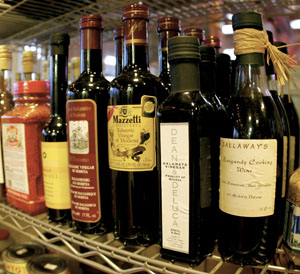You can’t sip with us: County alcohol ordinances stand in way of farm-saving winery
Twenty-one thousand acres of golden hay and alfalfa used to make up Mt. Naomi Farms in Cache County, Utah. The farm’s high-grade cash crop is still sold to polo clubs in Illinois, Kentucky, Louisiana, Georgia and North Carolina.
But as owner Keith Meikle sits on a piece of farm equipment in his field, he sees rows of houses where his crops used to be.
The rapid increase of housing developments have caused Meikle and his wife Brenda to feel like they are being squeezed at both ends.
In terms of the farm’s survival, they’ve got a plan. The only problem is that it involves alcohol — and in a state run by teetotalers, that’s a challenge.
“It’s mind bogglingly frustrating,” Keith said.
The Meikles saw the writing on the wall years ago as more of the land they rented was being bought up for housing development. In 2009 they planted several fruit crops to try to find a means of adaptation and survival. They settled on grapes as Mt. Naomi’s future.
A winery and vineyard seemed to be the perfect plan. Not only can the grapes be sold at a much higher profit rate than crops like strawberries, but wineries are few and far between in Utah. The addition of one in the area would be a unique attraction. Keith said it would draw in people from Salt Lake City and out-of-state to Cache County. He even enrolled in and completed a Master’s program in winemaking at UC Davis to prepare himself for the venture.
But the plan has been caught on a hitch — strict alcohol laws in Cache County and a council wary of changing them have put the winery operation almost at a standstill.
“So, we talked to a lobbyist… he said it wouldn’t be any more than six months,” Brenda said. “It’s been two years.”
The controversy of allowing the sale of alcohol in businesses is not a new struggle in Cache County. In 2013, the city of Hyde Park was divided over a decision to allow a Maverik gas station sell alcohol. The debate narrowly passed the city council and eventually had to go to the public for a vote.
“It was really close,” Gina Worthen, a Hyde Park representative on the Cache County council, said.
Worthen said she doesn’t see many negative side effects from allowing a winery in Cache County, but acknowledged there may be others on the council who have reservations.
According to Keith, two ordinances need to be passed in order for the winery to be worth the trouble: One to allow the winery to operate and another to allow the Meikles to run a cash bar.
In an overwhelmingly conservative county known for cracking down on the misuse of alcohol — one in which an estimated 86.5% of residents are members of the Church of Jesus Christ of Latter-day Saints, which discourages alcohol consumption — many on the council are wary of changing the laws to allow for a winery within county jurisdiction. Keith said one even remarked that it would be like “letting the camel’s nose under the tent.”
“So you’re going, ‘Well, who’s the camel? Am I the camel?’” Keith said. “That doesn’t seem very accepting of people outside of your belief structure.”
According to chief civil deputy county attorney John Luthy, the county’s alcohol ordinances have not been updated in multiple decades and don’t line up with the state’s current statutes in terms of terminology. But this update isn’t something the county is willing to expedite.
“Our county council here is being thoughtful and deliberate as they consider that request that’s come from the Meikles and others,” Luthy said.
Worthen said part of the delay was because the council doesn’t want to craft legislation that is only specific to one business or has unintended consequences for businesses.
When time is of the essence, Keith said it’s hard to not to grow frustrated. Land continues to be bought away from the farm, less than 1800 acres remain. And once Mt. Naomi gets to a certain size, the Meikles won’t be able to turn a profit on their hay and alfalfa. The crop that has kept food on the table in Keith’s family for multiple generations will become worthless.
“We thought we had 10 years, six months ago, and right now, the development, and the building, and the number of acres that are going into houses, and the pricing and the shortage that COVID has created… We’ve lost five years,” Keith said. “We’re at a five year window of it’s going to become unsustainable.”
In their efforts to adapt and overcome, the Meikles have even begun considering annexation into Smithfield.
“Imagine a farm annexing into a city so it can stay a farm,” Keith said. “It’s so asinine it’s unbelievable.”

